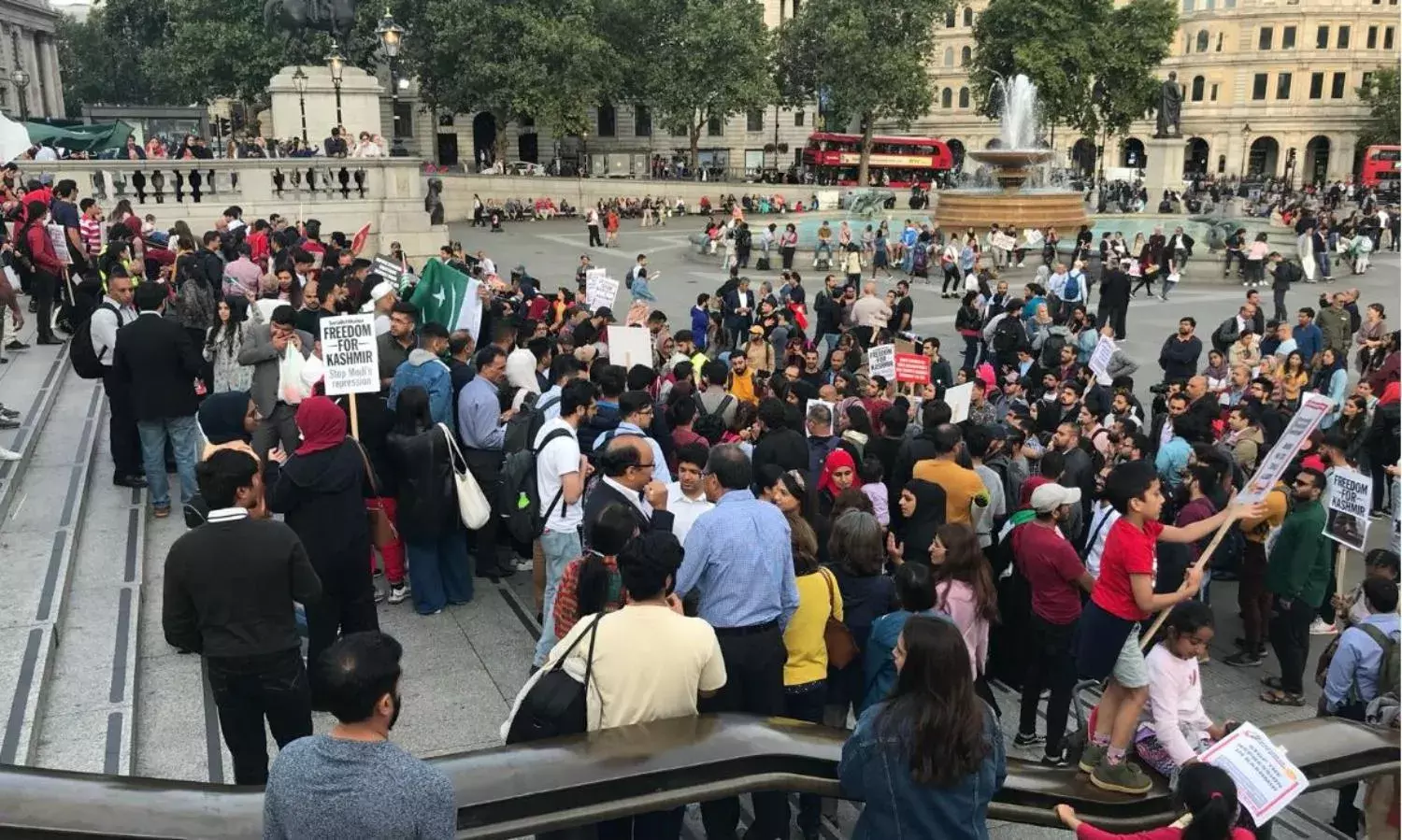
Thousands of protestors participated in a large-scale demonstration yesterday in front of the Indian High Commission, against the Modi government’s decisions and military lock down in Jammu and Kashmir The demonstration, that continued for 2-3 hours, spread to Trafalgar Square by the evening.
Reuters journalist Estelle Shirbon reported that several protestors had arrived in London from various English cities by chartered buses. The protestors carried Kashmiri and Pakistani flags. Some carried placards, demanding ‘Freedom for Kashmir’, ‘Stop the repression in Kashmir’ and ‘India should be held accountable for crimes against humanity in J&K’.
Interestingly, a similar protest, involving 250 people, had taken place on August 10, 2019 in front of the Indian High Commission. It did not garner international and social media attention and was dispersed easily.
UK’s newspaper The Guardian mentions that there are 1.1 million British Pakistanis in UK, of which more than 1 million originate from Kashmir. But this data can be further debated due to the lack of a regular census.
Scholars like Dr. Nasreen Ali (Senior Research Fellow in Public Health at University of Berfordshire) have studied this diaspora in Luton (small town in the North of London) in late 1990s. Most of these Kashmiris originally hail from Kashmir in Pakistan, especially from regions like Mirpur, Kotli and Bhimber.
Professor Martin Sökefeld who specialises in diaspora studies, has previously stated that there is no reliable and accurate census of the number of Kashmiris in UK, thereby rendering them invisible.
Though, the Kashmiri diaspora in UK started emerging after the second world war. Most of the Kashmiri migrants worked in steel and textile industries.
Muzamil Khan’s PhD Thesis on ‘Devotional Islam in Kashmir and the British diaspora: the transmission of popular religion from Mirpur to Lancashire’ revealed that there were 400,000 Kashmiris from Mirpur alone origin in UK by 2006.
Also, as British election system gives electoral weight to minorities, the British Kashmiris started participating in the local elections by 1970s. The opposition Labour Party had been their political representation.
Meanwhile, there is no accurate account of the number of Indian Kashmiris in UK. Overall, the British Indian diaspora roughly amounts to 1.4 million, with strong identities and loyalties to the Indian state.
The Indo European Kashmir Forum (established in late 1980s) is dedicated for support and solidarity for the Kashmiri Hindu population in UK. Nitasha Kaul, a London-based Indian academic of Kashmiri origin, tweeted that ‘India’s Kashmir Policy includes calling critical international media as fake news, speaking of own independence while being colonial, fantasising about possessing Kashmiri landscape and women as property along with hailing Modi and the Hindu religion.’
It is believed that several events would be organised by BJP supporters in September to show solidarity with the scrapping of Article 370 and 35A.
A joint statement in support and solidarity with Jammu and Kashmir has been signed by 250 scholars from across the world. The signatories include Partha Chatterjee, Kul Chandra Gautam, Gyanendra Pandey, Chandra Talpade Mohanty, M.V. Ramana, Pervez Hoodbhoy, Zia Mian, Sofia Karim, Sharmeen Obaid Chinoy, Martha Nussbaum, and Sheldon Pollock. The statement urged the Indian government to “immediate end the inhuman clampdown in Jammu and Kashmir, to restore civil liberties as well as the flow of information, immediately release all political detainees and prisoners and to enter into dialogue with the people of Jammu and Kashmir.”
Meanwhile, the British government remains tight-lipped regarding Kashmir’s military lockdown.
All Photographs Alexander Seale, British journalist

